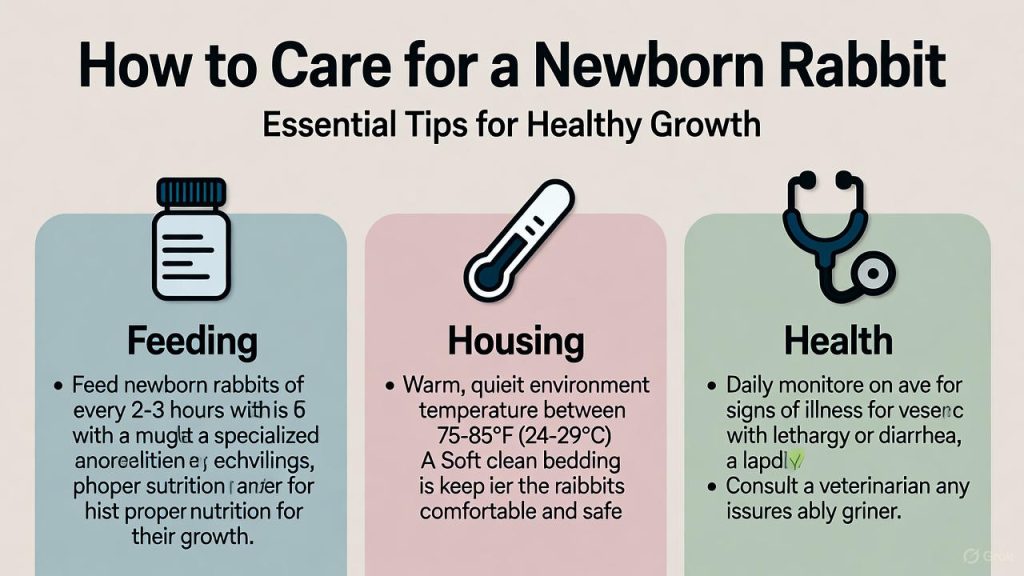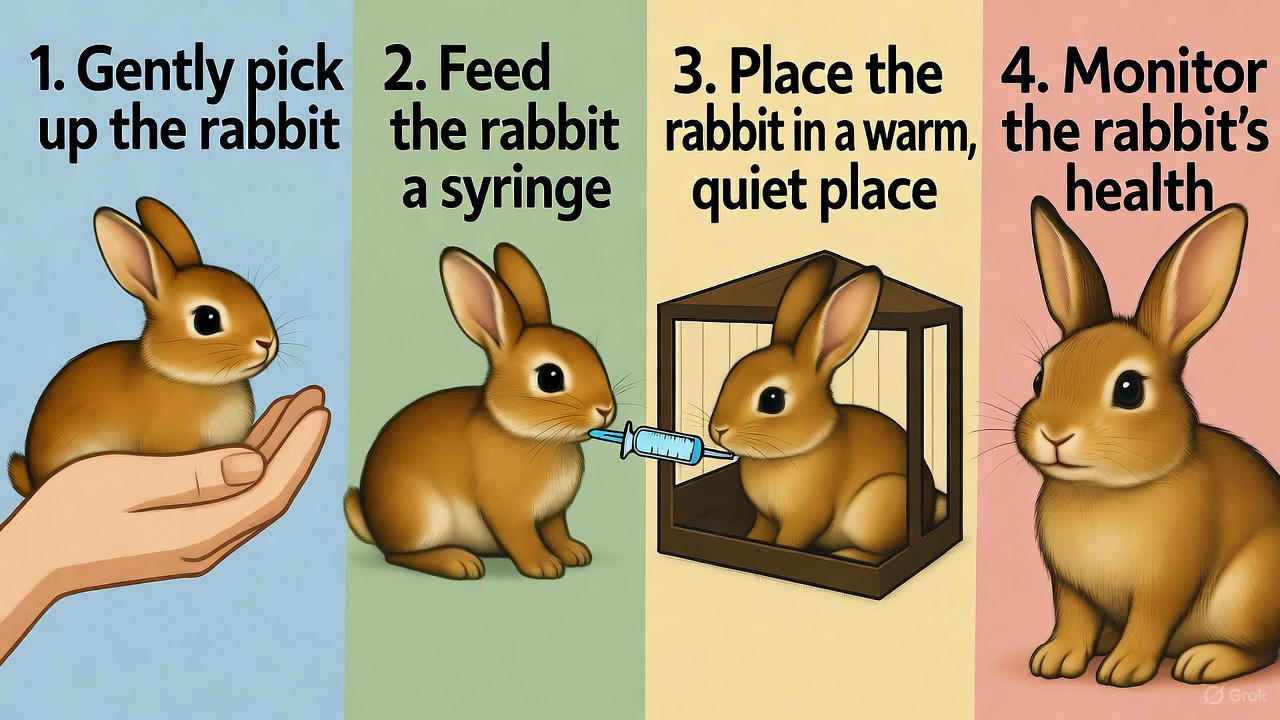How to Care for a Newborn Rabbit?
Bringing home a newborn rabbit fills your heart with joy, but it also comes with serious responsibilities. Baby bunnies are delicate creatures that need specific care to thrive and grow into healthy adult rabbits. This comprehensive guide walks you through everything you need to know about caring for these tiny, vulnerable animals.
The First Days: What You Need to Know About Baby Rabbits
Newborn rabbits, called kits or kittens, come into the world completely helpless. They’re born blind, deaf, and hairless. Their eyes stay closed for about 10 days, and they depend entirely on their mother for survival during the first few weeks of life.
If you find yourself caring for orphaned baby bunnies or helping a domestic rabbit mother, you’ll need to understand their developmental stages. Baby rabbits grow incredibly fast. Within three weeks, they transform from tiny, pink creatures into fluffy, hopping juveniles.
The ideal scenario involves leaving kits with their mother until they’re at least 8 weeks old. Mother rabbits produce nutrient-rich milk that contains antibodies essential for building the baby’s immune system. This milk helps protect them from diseases and infections during their most vulnerable period.
Creating a Safe Nest for Baby Bunnies
Your first priority is setting up a proper living space. Baby rabbits need a warm, quiet environment protected from predators, loud noises, and temperature fluctuations.
Start with a nesting box if the mother rabbit hasn’t created one herself. A cardboard box works perfectly for this purpose. Fill it with soft hay, never straw, as straw can be too rough for delicate baby skin. The mother will pull fur from her chest to line the nest, creating an insulating layer that keeps the kits warm.
Place the nesting box in a quiet corner away from household traffic. Rabbits are prey animals, and too much activity stresses them out. The mother needs to feel safe to care for her babies properly.
Temperature control is critical. Newborn rabbits can’t regulate their body temperature for the first week of life. Keep the room temperature between 65-70°F (18-21°C). If the environment feels too cold, use a heating pad set on low under half of the nesting box. This lets the babies move away from the heat if they get too warm.
Feeding Orphaned Baby Rabbits: A Delicate Process
Sometimes mother rabbits abandon their litter, or they may die during birth. In these heartbreaking situations, you become the sole caregiver. Hand-raising baby rabbits requires dedication, patience, and the right supplies.
Never feed baby rabbits cow’s milk or any other pet milk replacer meant for cats or dogs. These products lack the proper nutrients and can cause fatal digestive problems. Instead, you need kitten milk replacer (KMR) or goat’s milk, which more closely matches rabbit milk composition.
Here’s a simple formula recipe that works well:
- 1/2 cup of whole goat’s milk
- 1/2 tablespoon of sugar-free heavy whipping cream
- 1 egg yolk (for extra protein and fat)
Mix these ingredients thoroughly and warm the formula to body temperature before feeding. Test the temperature on your wrist—it should feel comfortably warm, not hot.
Use a small syringe or eye dropper for feeding. Never use a bottle with a nipple, as baby rabbits can easily aspirate liquid into their lungs. Feed the kit in an upright position, never on its back.
Newborn rabbits eat twice daily—once in the early morning and once at night. This mimics the natural feeding pattern of wild rabbits. Each feeding session should last only a few minutes. Baby bunnies have tiny stomachs that hold very little formula.
Here’s a feeding schedule based on age:
Week 1: Feed 2-2.5 cc of formula twice daily Week 2: Increase to 5-7 cc twice daily Week 3: Provide 7-13 cc twice daily Week 4-6: Offer 13-15 cc twice daily
After each feeding, gently massage the baby’s genital area with a warm, damp cotton ball. This stimulates urination and defecation. Mother rabbits lick their kits to encourage elimination, and you’re replicating this behavior.
Monitoring Growth and Health in Young Rabbits
Healthy baby rabbits grow rapidly. They should gain weight daily and develop thick, soft fur by their second week. Weigh each kit daily using a small kitchen scale. Any baby that stops gaining weight or loses weight needs immediate veterinary attention.
Watch for these signs of a thriving baby rabbit:
- Round, plump belly after feeding
- Pink, warm skin
- Active movement when handled
- Steady weight gain
- Clear eyes once they open (around day 10)
- Clean bottom with no signs of diarrhea
Red flags that indicate trouble:
- Bloated or hard belly
- Cold body temperature
- Wrinkled, dehydrated skin
- Weight loss or stagnant growth
- Labored breathing
- Blue-tinged skin
- Lethargy or lack of response
Dehydration kills baby rabbits quickly. Check for dehydration by gently pinching the skin on the back of the neck. If it stays tented up instead of snapping back, the kit needs fluids immediately. Contact a rabbit-savvy veterinarian right away.
When Baby Rabbits Start Eating Solid Food
Around three weeks old, baby rabbits begin exploring solid food. Their eyes are open, they’re hopping around, and curiosity drives them to nibble on whatever the mother eats.
Start introducing timothy hay at this stage. Hay should make up the majority of an adult rabbit’s diet, and getting babies accustomed to it early sets them up for success. Place fresh hay in the nesting area where the kits can easily access it.
You can also offer small amounts of alfalfa hay to growing rabbits. Alfalfa contains more protein and calcium than timothy hay, supporting rapid growth. However, limit alfalfa for adult rabbits as the extra calcium can cause urinary problems.
At four weeks, introduce high-quality rabbit pellets. Look for pellets made specifically for young rabbits, as these contain the right nutrient balance for growing bodies. Offer only a small handful daily. Too many pellets can cause digestive upset and obesity later in life.
Fresh vegetables come next, but wait until the rabbits are at least 12 weeks old before adding them to the diet. Young digestive systems need time to mature before handling fresh greens. When you do introduce vegetables, start with small amounts of romaine lettuce or cilantro.
Always provide fresh, clean water in a shallow dish. Baby rabbits can drown in deep water bowls, so keep the water level low until they’re older and more coordinated.

Weaning Baby Rabbits from Milk
Natural weaning happens gradually between 4-8 weeks of age. Mother rabbits nurse less frequently as the kits eat more solid food. If you’re hand-raising orphaned babies, follow this same timeline.
Start reducing formula feedings as the kits consume more hay and pellets. By six weeks, most baby rabbits drink formula only once per day. At eight weeks, they’re fully weaned and eating a diet of hay, pellets, and eventually fresh vegetables.
Never rush the weaning process. Weaning too early leads to digestive problems, weakened immunity, and behavioral issues. Baby rabbits need those crucial weeks with their mother or caregiver to develop properly.
Socialization and Handling Young Rabbits
Baby rabbits need gentle handling to become friendly, social pets. Start handling kits once they’re about two weeks old and their eyes are open. Keep sessions short—just a few minutes at first.
Always support the rabbit’s entire body when you pick it up. Place one hand under the chest and the other under the hindquarters. Never pick up a rabbit by the ears or scruff. This causes pain and can lead to serious injuries.
Sit on the floor when handling baby bunnies. They’re wiggly and can jump from your arms unexpectedly. A fall from even a short height can break a rabbit’s back or legs.
Speak softly around young rabbits. Loud noises frighten them and trigger stress responses. Create a calm environment where they feel safe exploring and interacting with you.
If you have multiple baby rabbits, they’ll bond with each other through play and grooming. This social interaction is vital for their emotional development. Rabbits are highly social animals that thrive with companionship.
Common Health Problems in Newborn Rabbits
Despite your best efforts, baby rabbits can develop health issues. Knowing what to watch for helps you act quickly when problems arise.
Diarrhea is extremely dangerous for baby rabbits. It causes rapid dehydration and can be fatal within hours. If you notice soft, runny stools, stop all formula and solid food immediately. Offer only water and contact a veterinarian. Diarrhea in baby rabbits often stems from improper formula, overfeeding, or introducing solid foods too early.
Bloat occurs when gas builds up in the stomach or intestines. A bloated baby rabbit has a distended, hard belly and appears uncomfortable. This is a medical emergency requiring immediate veterinary care. Bloat can result from feeding the wrong type of milk or feeding too quickly.
Pasteurellosis is a bacterial infection that causes respiratory problems. Symptoms include sneezing, nasal discharge, and difficulty breathing. Baby rabbits catch this from their mother or from contaminated environments. Antibiotics prescribed by a vet can treat the infection if caught early.
Malocclusion refers to misaligned teeth. While this often doesn’t show up until rabbits are older, it can have genetic origins. Watch for difficulty eating or drooling. Rabbits with malocclusion need regular dental care throughout their lives.
Eye infections can develop once the eyes open. If you notice crusty discharge, swelling, or cloudiness, clean the eyes gently with a warm, damp cloth and consult a veterinarian. Untreated eye infections can lead to blindness.
Preparing for Long-Term Rabbit Care
As your baby rabbit grows, your care routine evolves. By 8-12 weeks, young rabbits are ready to transition to their permanent housing setup.
Invest in a large enclosure or rabbit-proof a room in your home. Rabbits need space to run, jump, and play. A cage should be at least four times the length of an adult rabbit, with room to stand on their hind legs.
Litter training starts around 8 weeks when rabbits naturally choose a bathroom spot. Place a litter box in the corner where the rabbit tends to go. Use paper-based litter—never clay or clumping cat litter, which is toxic if ingested.
Rabbits need daily exercise outside their enclosure. Create a safe play area where your bunny can explore. Remove electrical cords, toxic plants, and small objects they might chew or swallow.
Consider spaying or neutering your rabbit between 4-6 months of age. This prevents reproductive cancers, reduces aggressive behavior, and makes litter training easier. Discuss the best timing with a rabbit-experienced veterinarian.
Finding a Rabbit-Savvy Veterinarian
Not all veterinarians have experience with rabbits. These exotic pets require specialized knowledge. Before you need emergency care, locate a vet who regularly treats rabbits.
Schedule a wellness check when your baby rabbit reaches 8 weeks old. The vet will examine the rabbit, check for parasites, and discuss vaccination options. In areas where rabbit hemorrhagic disease (RHDV2) occurs, vaccination is critical.
Build a relationship with your vet early. When emergencies happen—and they do—you’ll have a trusted professional to call. Keep the vet’s phone number and hours in an easily accessible place.
The Emotional Rewards of Raising Baby Rabbits
Caring for newborn rabbits takes time, patience, and dedication. The late-night feedings and constant monitoring can feel overwhelming. But watching these tiny creatures grow into healthy, playful rabbits makes every effort worthwhile.
You’ll witness incredible transformations. That helpless newborn who fit in your palm becomes a curious juvenile exploring the world. The nervous kit who trembled at your touch learns to trust and even seek out your attention.
Baby rabbits form strong bonds with their caregivers. They remember the person who fed them, kept them warm, and made them feel safe. This bond lasts throughout their lives, which can span 10-12 years with proper care.
Each baby rabbit has a unique personality. Some are bold and adventurous. Others are gentle and cautious. Getting to know your rabbit’s individual quirks deepens your connection and helps you provide the best possible care.
Building a Support Network
Caring for newborn rabbits becomes easier with support from experienced rabbit owners. Join online forums, local rabbit clubs, or social media groups dedicated to rabbit care. These communities offer advice, encouragement, and answers to your questions.
The House Rabbit Society is an excellent resource for new rabbit owners. Their website contains detailed care guides, health information, and tips for rabbit-proofing your home. Many cities have local chapters that provide hands-on support.
Connect with a rabbit rescue organization in your area. These groups have volunteers with years of experience raising orphaned and abandoned rabbits. They can mentor you through the challenging early weeks.
Don’t hesitate to ask for help. Experienced rabbit people remember their first time caring for baby bunnies. They’re usually happy to share what they’ve learned and support newcomers to rabbit care.
Your Journey as a Rabbit Parent Begins
Caring for a newborn rabbit is one of the most rewarding experiences an animal lover can have. Yes, it’s challenging. Yes, it requires sacrifice. But the joy these small creatures bring into your life makes it all worthwhile.
Start with the basics: proper housing, correct formula, consistent feeding schedule, and vigilant health monitoring. Build on this foundation as your rabbit grows and develops.
Stay patient with yourself and your bunny. You’ll make mistakes—everyone does. What matters is that you keep learning, keep trying, and keep providing the best care possible.
Your newborn rabbit depends on you for everything. With the information in this guide, you’re equipped to give that tiny bunny the start in life it deserves. Soon, you’ll have a healthy, happy companion who enriches your life in ways you never imagined.
The bond between a rabbit and their human is special. Nurture it carefully during these early weeks, and you’ll have a loving friend for many years to come.







